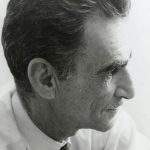1
There are things
We live among ‘and to see them
Is to know ourselves’.
Occurrence, a part
Of an infinite series,
The sad marvels;
Of this was told
A tale of our wickedness.
It is not our wickedness.
‘You remember that old town we went to, and we sat in the ruined window, and we tried to imagine that we belonged to those times—It is dead and it is not dead, and you cannot imagine either its life or its death; the earth speaks and the salamander speaks, the spring comes and only obscures it—’
2
So spoke of the existence of things,
An unmanageable pantheon
Absolute, but they say
Arid.
A city of the corporations
Glassed
In dreams
And images—
And the pure joy
Of the mineral fact
Tho it is impenetrable
As the world, if it is matter,
Is impenetrable.
3
The emotions are engaged
Entering the city
As entering any city.
We are not coeval
With a locality
But we imagine others are,
We encounter them. Actually
A populace flows
Thru the city.
This is a language, therefore, of New York
4
For the people of that flow
Are new, the old
New to age as the young
To youth
And to their dwelling
For which the tarred roofs
And the stoops and doors—
A world of stoops—
Are petty alibi and satirical wit
Will not serve.
5
The great stone
Above the river
In the pylon of the bridge
‘1875’
Frozen in the moonlight
In the frozen air over the footpath, consciousness
Which has nothing to gain, which awaits nothing,
Which loves itself
6
We are pressed, pressed on each other,
We will be told at once
Of anything that happens
And the discovery of fact bursts
In a paroxysm of emotion
Now as always. Crusoe
We say was
‘Rescued’.
So we have chosen.
7
Obsessed, bewildered
By the shipwreck
Of the singular
We have chosen the meaning
Of being numerous.
8
Amor fati
The love of fate
For which the city alone
Is audience
Perhaps blasphemous.
Slowly over islands, destinies
Moving steadily pass
And change
In the thin sky
Over islands
Among days
Having only the force
Of days
Most simple
Most difficult
9
‘Whether, as the intensity of seeing increases, one’s distance from Them, the people, does not also increase’
I know, of course I know, I can enter no other place
Yet I am one of those who from nothing but man’s way of thought and one of his dialects and what has happened to me
Have made poetry
To dream of that beach
For the sake of an instant in the eyes,
The absolute singular
The unearthly bonds
Of the singular
Which is the bright light of shipwreck
10
Or, in that light, New arts! Dithyrambic, audience-as-artists! But I will listen to a man, I will listen to a man, and when I speak I will speak, tho he will fail and I will fail. But I will listen to him speak. The shuffling of a crowd is nothing—well, nothing but the many that we are, but nothing.
Urban art, art of the cities, art of the young in the cities—The isolated man is dead, his world around him exhausted
And he fails! He fails, that meditative man! And indeed they cannot ‘bear’ it.
11
it is that light
Seeps anywhere, a light for the times
In which the buildings
Stand on low ground, their pediments
Just above the harbor
Absolutely immobile,
Hollow, available, you could enter any building,
You could look from any window
One might wave to himself
From the top of the Empire State Building—
Speak
If you can
Speak
Phyllis—not neo-classic,
The girl’s name is Phyllis—
Coming home from her first job
On the bus in the bare civic interior
Among those people, the small doors
Opening on the night at the curb
Her heart, she told me, suddenly tight with happiness—
So small a picture,
A spot of light on the curb, it cannot demean us
I too am in love down there with the streets
And the square slabs of pavement—
To talk of the house and the neighborhood and the docks
And it is not ‘art’
12
‘In these explanations it is presumed that an experiencing subject is one occasion of a sensitive reaction to an actual world.’
the rain falls
that had not been falling
and it is the same world
. . .
They made small objects
Of wood and the bones of fish
And of stone. They talked,
Families talked,
They gathered in council
And spoke, carrying objects.
They were credulous,
Their things shone in the forest.
They were patient
With the world.
This will never return, never,
Unless having reached their limits
They will begin over, that is,
Over and over
13
unable to begin
At the beginning, the fortunate
Find everything already here. They are shoppers,
Choosers, judges; . . . And here the brutal
is without issue, a dead end.
They develop
Argument in order to speak, they become
unreal, unreal, life loses
solidity, loses extent, baseball’s their game
because baseball is not a game
but an argument and difference of opinion
makes the horse races. They are ghosts that endanger
One’s soul. There is change
In an air
That smells stale, they will come to the end
Of an era
First of all peoples
And one may honorably keep
His distance
If he can.
14
I cannot even now
Altogether disengage myself
From those men
With whom I stood in emplacements, in mess tents,
In hospitals and sheds and hid in the gullies
Of blasted roads in a ruined country,
Among them many men
More capable than I—
Muykut and a sergeant
Named Healy,
That lieutenant also—
How forget that? How talk
Distantly of ‘The People’
Who are that force
Within the walls
Of cities
Wherein their cars
Echo like history
Down walled avenues
In which one cannot speak.
15
Chorus (androgynous): ‘Find me
So that I will exist, find my navel
So that it will exist, find my nipples
So that they will exist, find every hair
Of my belly, I am good (or I am bad),
Find me.’
16
‘. . . he who will not work shall not eat,
and only he who was troubled shall find rest,
and only he who descends into the nether world shall rescue his beloved,
and only he who unsheathes his knife shall be given Isaac again. He who will not work shall not eat. . .
17
The roots of words
Dim in the subways
There is madness in the number
Of the living
‘A state of matter’
There is nobody here but us chickens
Anti-ontology—
He wants to say
His life is real,
No one can say why
It is not easy to speak
A ferocious mumbling, in public
Of rootless speech
18
It is the air of atrocity,
An event as ordinary
As a President.
A plume of smoke, visible at a distance
In which people burn.
19
Now in the helicopters the casual will
Is atrocious
Insanity in high places,
If it is true we must do these things
We must cut our throats
The fly in the bottle
Insane, the insane fly
Which, over the city
Is the bright light of shipwreck
20
—They await
war, and the news
Is war
As always
That the juices may flow in them
Tho the juices lie.
Great things have happened
On the earth and given it history, armies
And the ragged hordes moving and the passions
Of that death. But who escapes
Death
Among these riders
Of the subway,
They know
But now as I know
Failure and the guilt
Of failure.
As in Hardy’s poem of Christmas
We might half-hope to find the animals
In the sheds of a nation
Kneeling at midnight,
Farm animals,
Draft animals, beasts for slaughter
Because it would mean they have forgiven us,
Or which is the same thing,
That we do not altogether matter.
21
There can be a brick
In a brick wall
The eye picks
So quiet of a Sunday
Here is the brick, it was waiting
Here when you were born
Mary-Anne.
22
Clarity
In the sense of transparence,
I don’t mean that much can be explained
Clarity in the sense of silence.



















Comment form: